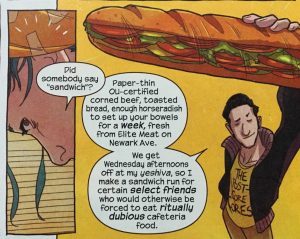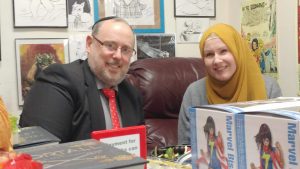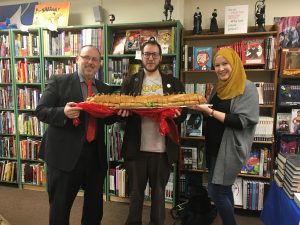It sounds like a joke but that’s what really happened. Here’s how it came about.

About two months ago, we reported that the OU had been name-checked in a Marvel comic. Ms. Marvel #25 introduced a new character named Naftali, an Orthodox Jew. Naftali was looking for the title character’s secret identity of Kamala Khan in order to share a sandwich. (Kamala is a Muslim; she and her friend Naftali share what the comic calls some “weird dietary restrictions.”) This particular sandwich is described as “paper-thin OU-certified corned beef, toasted bread (and) enough horseradish to set up your bowels for a week.”
Obviously, this development was of interest to the OU but the OU was not the only outlet to report on it. Aside from Jewish media, like Tablet and the Jewish Standard, a number of comic book sites commented not only on the introduction of an observant Jew to the cast but on the sandwich itself. (A site called “Black Nerd Problems,” in its review of Ms. Marvel #25, called it “the ultimate sandwich” and rated the issue “8.3 Sandwich Gawds out of 10.”) As it turns out, the amount of interest in the sandwich – intended as a simple throwaway gag of a plot device – was a complete surprise to the writer of the issue, and creator of Kamala Kahn, G. Willow Wilson.
 Based on the surprisingly high level of interest in the original story, we decided to do a follow-up, asking how an observant Muslim writer came to introduce an Orthodox character bearing the world’s greatest OU-certified sandwich. We reached out to Menachem Luchins, owner of Escape Pod Comics in Huntington, NY, to arrange a virtual introduction. As it turns out, Escape Pod Comics was hosting an event on February 21 at which Ms. Wilson would be speaking and signing.
Based on the surprisingly high level of interest in the original story, we decided to do a follow-up, asking how an observant Muslim writer came to introduce an Orthodox character bearing the world’s greatest OU-certified sandwich. We reached out to Menachem Luchins, owner of Escape Pod Comics in Huntington, NY, to arrange a virtual introduction. As it turns out, Escape Pod Comics was hosting an event on February 21 at which Ms. Wilson would be speaking and signing.
A brief aside: Escape Pod Comics may be the only Shomer Shabbos (Sabbath-observant) comic book store in the country, if not the world. (Are there Shomer Shabbos comic book stores in Israel? I have no idea.) Menachem Luchins also has an OU connection: his parents, Dr. David and Vivian Luchins, are self-proclaimed “veteran NCSYers,” who have both served for many years on the Board of the OU. (NCSY is the Orthodox Union’s youth movement; Dr. and Mrs. Luchins are founding members of NCSY’s Ben Zakkai Honor Society.)
Since Ms. Wilson would be coming to New York from the west coast for this event, it was decided to delay the interview in order to conduct it in person. As a token of appreciation for the shout-out, OU Kosher, under the leadership of CEO Rabbi Menachem Genack, sent a real-life sandwich for the occasion.
Which brings us to February 21 at Escape Pod Comics, when a Jew and a Muslim walked into a comic book shop and the proprietor handed them a sandwich. Without further ado, we present our interview with the creator of Kamala Kahn (and Naftali, and the sandwich), G. Willow Wilson.
 Jack Abramowitz: How did you come to develop the character of Kamala Kahn as Ms. Marvel?
Jack Abramowitz: How did you come to develop the character of Kamala Kahn as Ms. Marvel?
G. Willow Wilson: Ms. Marvel came out of a phone call that I had in early 2012 with Sana Amanat and Stephen Wacker at Marvel. They called me up literally out of the blue and they pitched me a simple idea, which was ‘We want to create a new, young American-Muslim girl superhero and put her in her own ongoing monthly series.’ That was it. She had no name, no backstory, no powers, no nothing. It was just that idea. They asked me to develop the character and write the series. I almost said no because, at the time, it seemed like a crazy idea. The prevailing wisdom at that point was that new characters don’t sell, female characters don’t sell, and minority characters don’t sell, and this was going to be all three. I was already getting blowback for writing very mainstream stuff like Superman because it was thought that a Muslim writer should not have a place in the American comic book industry. I said, ‘You’re going to have to hire an intern just to open the hate mail’ but I said yes because how could I turn something like that down?
JA: Did you end up getting the hate mail you expected?
GWW: I still pinch myself because I was expecting the first issue to hit the stands and there to be maybe a flurry of press attention and then we’d have to deal with tons of negative tweet, tons of negative email, boycotts, calls for boycotts, and none of that really materialized. There was certainly some but it was a lot more muted than I was expecting it to be. I really have to credit readers and fans for the fact that the response was so positive. People really got in front of the book, really adopted this character and this series as their own from day one. There was such a wonderful, positive fan base around Kamala Kahn and the series as a whole, really from the very start, that a lot of that negativity got pushed to the side.
JA: How did Ms. Marvel come to have such a diverse, multicultural cast?
GWW: The supporting characters in Ms. Marvel really grew out of my experiences growing up in New Jersey, and those of Sana Amanat, the editor, as well. I was born in Monmouth County and lived there until I was 12, and the make-up of Kamala’s friends really reflects the make-up of my group of friends when growing up. I lived very close to Bell Labs, there were people who worked in Manhattan, it was very much kind of a sleeper suburb, and so my classmates were very often children of immigrants from all over the world, particularly south Asia and east Asia. There was quite a large Jewish community as well. So those were my cultural influences as a kid. And Sana, having grown up in Edison, grew up in very similar circumstances. There was a lot to draw on based on where we ultimately decided to set the series. It kind of grew naturally out of the geography and out of the culture of north and central Jersey.
 JA: What made you introduce Naftali to the cast?
JA: What made you introduce Naftali to the cast?
GWW: Naftali came around out of a desire that I had had for quite a while to add an openly Jewish character to the series. We have other characters who we could have passed off as being ‘culturally Jewish’ or having some kind of Jewish family background but I thought it was important to have a character in the series who was religious, to whom religious ritual and prayer and belief was of central importance. Because you don’t often see that in comic books. You see religion as sort of a cultural background, you see religion there as kind of a motivating emotional factor for some characters, but the actual practice is something that you don’t see a whole lot of, particularly for characters from minority religious backgrounds. So I said, ‘You know what? I’m not just going to retcon* an existing character having, like, a Jewish background. Let’s create an entirely new character who’s Orthodox, or modern Orthodox, and show some of that overlap.’ Living in a place where we don’t have a lot of zabiha** butchers, halal** meat is not easy to get, myself and a lot of my friends often end up eating kosher meat. That’s a point of sort of interesting overlap between me and my Jewish friends. I was like, ‘There’s a connection right there’ and it would be really interesting to explore. I don’t think I’ve ever seen that in a comic book before.
* “Retcon” is short for “retroactive continuity.” It refers to the practice of introducing an innovation to the story under the premise that such was really always the case all along.
** “Halal” is the Muslim equivalent of kosher. “Zabiha” refers to laws specific to the halal status of meat, in particular that the animal is slaughtered by hand.
JA: How was Naftali received by the readers?
GWW: I was really pleased to see the positive reaction to Naftali as a character. It’s always a risk when you introduce somebody new into a series that already has a large ensemble cast because the challenge is how you get them to stand out, how you get fans to care about them. In the case of Naftali, he just kind of wrote himself. I wanted to give him a very distinct voice and way of speaking, and he gets his own kind of side adventure. So I’ve gotten several tweets from people who say, ‘You know what? I would totally read a miniseries just about this guy.’ I was going back and forth with someone about how Naftali needs his own Bored to Death-style, amateur sleuth miniseries set in the Marvel U(niverse). Anything is possible, so maybe one day that’ll happen!
 JA: Why mention the OU?
JA: Why mention the OU?
GWW: In Ms. Marvel, I – and everybody – try to be very specific. We don’t make things up unless we have to. We use specific locations in Jersey City, we use specific cultural events and references, so for this particular sandwich that becomes a big plot device – when Kamala disappears from her high school and has to be tracked down and the sandwich is part of this whole chase – I wanted to talk about real kosher meat that I eat. The OU in particular is of special importance to me because my husband and I keep the strictest version of zabiha at home, which is analogous to the strictest interpretation of kosher. When we go to a grocery store and we’re looking at kosher meat, we actually check the labels and the OU is one of very few certifying bodies whose interpretation of kosher matches the sort of strict interpretation of zabiha that we follow. So going on a quest, looking for OU-certified meat, is a specific part of my life! I wanted that specific thing to be reflected in the book. I didn’t want to make something up when there was already something quite real that I could draw from. But I had no idea it was going to be that big of a deal from a cultural perspective!
I lived in Egypt for about five years. That’s where I met my husband, who grew up in Cairo. So we lived there for the first part of our marriage. When we moved back to the United States, all of a sudden the kind of meat we were eating became an issue. Obviously, in Cairo we could go to any restaurant, any butcher, and eat anywhere and get zabiha meat. You’d have to try hard to find not-zabiha meat! And so, coming back here, it was a big sort of re-entry shock for me because I was not used to having to look for specific things. I was used to being able to go into a grocery store and grab whatever I wanted off the shelf, and now I had to be much more mindful about it. This led us, and some of our friends who were in a similar predicament, to have to do a lot of research about kosher certification, because kosher meat tends, in our area, to be much more widely available than zabiha meat. We were in this interesting scenario of being in a group of Muslim friends getting into arguments about kosher even though there was not a Jewish person among us! Finding OU specifically, and discovering that there was OU ground beef, stew meat and stuff like this carried at our local Trader Joe’s was like – I don’t know how to describe it! It allowed me to feel like I was back home because I could go somewhere that was local, that was part of my community, and find the things that I needed. That was surprisingly emotional for me.

Thanks to G. Willow Wilson, Escape Pod Comics, OU Kosher, and everyone who helped to bring this to fruition.
The words of this author reflect his/her own opinions and do not necessarily represent the official position of the Orthodox Union.

